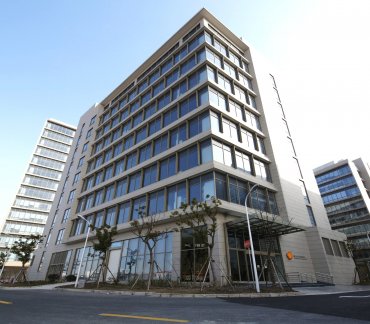SHANGHAI – Shell opened a 1.8 billion (U.S. $290 million) lubricant technology center in Shanghai last week. The worlds largest lubricant supplier hopes the facility will help it attract more business in China and in neighboring countries.
Occupying a nine-story, 8,600 square meter building in the high profile Zhangjiang High-tech Park, the center will house research on a wide range of lubes and greases, including passenger car and heavy-duty engine oils, motorcycle oils and transmission fluids, as well as specialty oils and greases.

Photo courtesy of Shell
Shell’s new Shanghai lubricant technology center is nine stories and 8,600 square meters.
The Shanghai facility is Shells third such center, joining laboratories in Houston, Texas, United States, and Hamburg, Germany.
With this center, we will be able to bring world-class technologies even closer to our lube customers and partners in China and Asia, Huibert Vigeveno, executive chairman of Shell China, said at a March 25 ceremony. Apart from creating competitive strategic advantage, this center will also help us attract the best talent to work for us in Shanghai.
In 2013, China passed the U.S. as the worlds largest net petroleum importer, according to the U.S. Energy Information Administration. In early March, the Chinese government declared a war on its notorious air pollution. These are two major reasons for Shell to open the Shanghai center, said Shell Projects & Technology Director Matthias Bichsel.
China needs to improve energy efficiency and reduce vehicle emissions at the same time, and this is where our Shanghai center could help, Bichsel said. He added that the center is a showcase of Shells technologies and is designed to be very open with its clients, including original equipment manufacturers such as Chinese automaker Geely.
Investing so much in a research center shows Shells confidence in the Chinese market, despite the likelihood that the countrys economy will continue to slow. The Chinese government set a goal of 7.5 percent growth in gross domestic product for 2014, the same as in 2013.
In lube consuming industries, there will be challenges in some sectors, such as steel, but we also see some promising sectors as they demand more environmentally friendly and fuel-economic products, said James Shen, general manager at Shell Lubricants China.
For example, he said, in the auto industry, families in small cities will likely buy their first car, and truck manufacturers will increasingly seek to reduce emissions as Chinas logistics industry continues to grow. Also, subway lines are under construction in cities across China. According to the China Civil Engineering Society, over 5,700 kilometers of subway lines in 36 Chinese cities had been approved by the end of 2013.
In general, Im very confident about the Chinese market, Shen said.